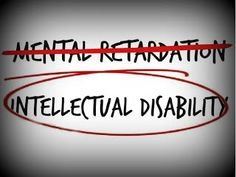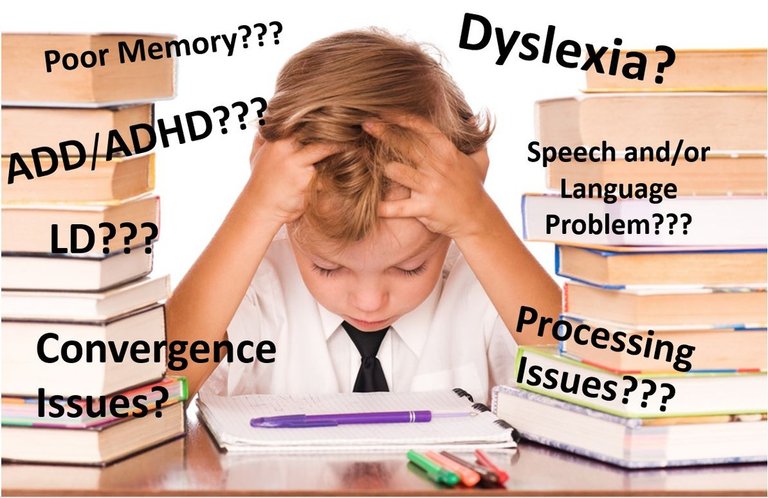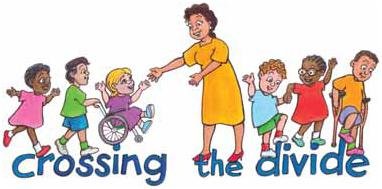
As children start schooling and increasingly have to meet the demands of academia, many children encounter barriers that impair their performances. These barriers could either be of an emotional nature such as depression or anxiety, or of a cognitive nature, or both.
INTELLECTUAL DISABILITY

“A low IQ was the most important criterion for a diagnosis of intellectual or mental disability (previously called mental retardation), usually an IQ below 70. However the unreliability and invalidity of IQ tests, especially regarding certain groups of people, lead to the inclusion of other criteria. These include limitations in certain mental abilities and adaptive behavior, given the person’s age and sociocultural background” (American Psychiatric Association, 2013)
Intellectual disability occurs along dimensions of mild, moderate and profound. However, the functioning of people in the different categories may differ widely. The following factors place people at risk for intellectual disability:
- Organic or biomedical factors, including genetic disorders (e.g. chromosomal disorders such as Down’s syndrome), malnutrition and traumatic brain surgery.
- Social factors such as poverty, child abuse and neglect, and domestic violence.
- Educational factors, including impaired parenting and inadequate special education services. Intellectual disability is a chronic (long-lasting) condition that poses limitations across many areas of development.
Consequently, programmes often have to be designed to fit the educational and developmental level of each individual child. Most psychosocial programmes focus on teaching the necessary skills and abilities to the child, such as language and social skills, personal care and hygiene, and providing support to parents and other caregivers. Medication is often necessary to control behavior such as compulsions, aggression, self-injury or hyperactivity. The effectiveness of the treatment programme will depend on the severity of the child’s condition, parental participation and implementation, family stability and formal social support.
However, intellectual disability may be largely prevented or reduced in severity, if proper precautions are taken. This includes appropriate prenatal care and prenatal screening, adequate nutrition and health care, and creating stimulating environments for children.

LEARNING DISABILITY
For some children with an average to above-average intelligence, school is a nightmare; although they believe they are doing their duty, results are just not forthcoming. This inevitably leads to disapproval – even rejection – by teachers and teasing from their peers. This in turn, may have devastating effects on their self-esteem and academic self-confidence. Many children ultimately suffer from depression or anxiety. Some withdraw from social interaction, while others act out in school (e.g. through aggressive or disruptive behavior).
There is a good chance that such children may suffer from a learning disability. A learning disability affects the manner in which individuals with average to above-average intelligence take in, retain, or express information. Incoming or outgoing information becomes scrambled as it passes between the senses and the brain. Therefore, limitations in speech, reading, writing or numeracy are experienced.

This means that specific aspects of school achievement are affected. The child’s performance is significantly lower than expected, given his or her intelligence, age and amount of schooling. It is, however, important to realize that such a diagnosis should not be used as a waste-paper basket for every child who does not do well at school. For example, children who have not been taught properly or lack motivation to learn, do not fall into this category. A learning disability is a distinct diagnostic category in which a child has to meet certain specific diagnostic criteria.
The problem is that learning disabilities are examples ‘silent’ problems in our community, which too often go undiagnosed and therefore untreated.
In an inclusive education system, it means that children with different learning needs including physical, mental, sensory, neurological and developmental impairments, psychosocial disturbances and differences in intellectual ability, are included in mainstream education.

While some children benefit from inclusive education, many children do not. Achievement gains depend on both the severity of the disability and the support services available in the regular classroom. Many classrooms are overcrowded and problems are compounded by the negative attitudes of teachers, parents, and other children. An inflexible curriculum, inadequately trained teachers, inappropriate and inadequate teaching and learning support services, inaccessible or unsafe environments and the non-involvement of parents are also contributing factor.
Parent involvement is of the utmost importance for inclusion to work. This means that parents have to apply this approach from the birth of the child. Social integration from the earliest days and the child’s full participation in family and community life are a preparation for the inclusive school experience and for the life of the community. In addition, parents need to focus on developing acceptable behavior in their children, as well as developing their communication skills as far as possible. Children need to learn acceptable behavior at home, in order to understand and accept discipline at school.


A well written paper on needs of children and parenting. Always enjoy your post, keep it up.
welcome my dear mama
Very informative. My child has special needs and there are days that you just want to give up, but you just have to keep on fighting.
Please just keep on fighting ;)
My child has ADHD and I found this to be a really interesting read. Thanks for sharing it. 😊
Thank you for reading my post. I am glad you found it interesting. @tanyaschutte wrote a post all about ADHD yesterday if you want to have a look there too ;) https://steemit.com/steemiteducation/@tanyaschutte/adhd-children-and-adults
Very detailed. Thank you :)
Pleasure! Thank you.
Inclusion is important and like you said, some benefit from inclusion and others don't. We have a few learners at our school who is intellectually disabled and what worries me is that they just can't cope with the work load. Since we only have one class per grade they have to be in with all the other learners. The main problem we are experiencing with this is that they are struggling as well as the intellectually "normal" learners are struggling, because they have to be held back because of these learners.
One class per grade! Oh no!
Peace, Abundance, and Liberty Network (PALnet) Discord Channel. It's a completely public and open space to all members of the Steemit community who voluntarily choose to be there.Congratulations! This post has been upvoted from the communal account, @minnowsupport, by Belinda from the Minnow Support Project. It's a witness project run by aggroed, ausbitbank, teamsteem, theprophet0, and someguy123. The goal is to help Steemit grow by supporting Minnows and creating a social network. Please find us in the
If you like what we're doing please upvote this comment so we can continue to build the community account that's supporting all members.
inetresting one !!!
Really interesting text! Our education system is really confusing and doesn't create the effects that it should. I was reading those articles here:
I think it complements what you have said and presents nice solutions for our educational problems! :D -> https://steemit.com/freedom/@thomasmmaker/article-a-thought-about-freedom-and-education-03 -> https://steemit.com/policyofliberty/@policyofliberty/our-great-enemy-the-government-schools-of-the-northern-hemisphere
Thank you for these links. I will be sure to have a look!
click here!This post received a 2.3% upvote from @randowhale thanks to @bdmomuae! For more information,